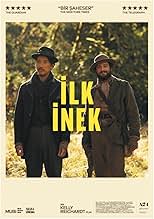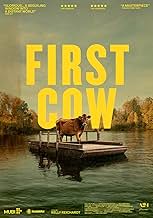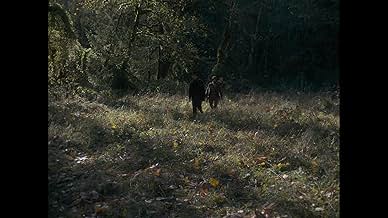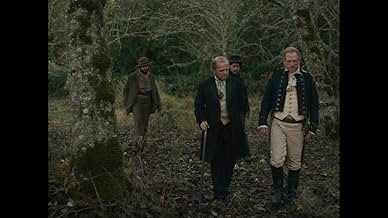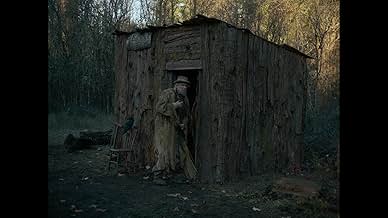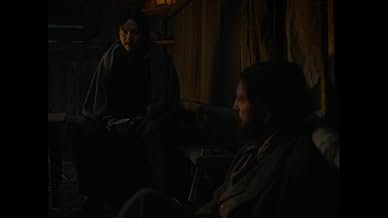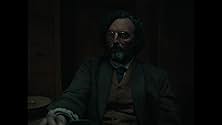VALUTAZIONE IMDb
7,1/10
23.425
LA TUA VALUTAZIONE
Un cuoco esperto ha viaggiato verso ovest e si è unito a un gruppo di cacciatori di pellicce in Oregon, anche se trova un vero legame solo con un immigrato cinese in cerca di fortuna. Presto... Leggi tuttoUn cuoco esperto ha viaggiato verso ovest e si è unito a un gruppo di cacciatori di pellicce in Oregon, anche se trova un vero legame solo con un immigrato cinese in cerca di fortuna. Presto i due collaborano a un affare di successo.Un cuoco esperto ha viaggiato verso ovest e si è unito a un gruppo di cacciatori di pellicce in Oregon, anche se trova un vero legame solo con un immigrato cinese in cerca di fortuna. Presto i due collaborano a un affare di successo.
- Regia
- Sceneggiatura
- Star
- Premi
- 21 vittorie e 141 candidature totali
Rene Auberjonois
- Man with Raven
- (as René Aubergenois)
Kevin Michael Moore
- Fort Trapper
- (as Kevin-Michael Moore)
Recensioni in evidenza
The film's visual style is impressive but it's story and pacing is what really drags this film down for me. The cinematography is the one aspect I found to be excellent. The framing is on point and impressive and it adds a lot to the film's style. The production design and costumes are also really good here too. These characters look and feel as if they in the 1820s. The performances are also great too. Each character feels believable and works to help tell the story of the film. Although I like all that, the pacing is not very good. It feels incredibly long and tedious without any real majorly satisfying payoff. It's a 2 hour movie that feels like it goes on for 2 and a half hours. If they had cut down some of the scenes, this issue wouldn't be as major as it is. There were some elements of the story I enjoyed and some I found to be pointless. If you like A24 then check it out but don't have your hopes incredibly high for it.
A positive surprise. At first the film feels that it doesnt know where it goes and shows a VERY detailed introduction of its two protagonists. But detail is the key word for this newest feature by Kelly Reichardt. The visuals are extremely detailed and so are the characters in general. We get a lot of information just by watching them in their daily lives and slowly the plot thickens and has some unexpected turns. Kelly Reichardt really did a fantastic job telling that story. She proves a fantastic eye for visuality, showing off some fantastic nature shots that really add a lot to the atmosphere of the film. She did everything right with this film, although she might once in a while loses herself a little bit too much in her details. The actors were wisely chosen and the leading roles filled with rather unknown actors who are usually in secondary roles. First of all there is John Magaro who is very subtle and effective. The better performance came from Orion Lee who is extremely charismatic and does a lot with the role given to him. I think he might have a very interesting future. I loved how he handled that role and gave it many different facettes. There is a good supporting performance by Toby Jones who does wonders with his rather one dimensional character. Ewen Bremner is a bit wasted, but not as much as Lily Gladstone which was insulting. Gladstone was brilliant in Reichardt's previous film, and ended up in my Top 5 Supporting Actresses so I was shocked how misused she was in this film. But thats just one of the very few flaws the film that. Another very positive note goes to the score, which is fantastic and as mentioned before the cinematography. Give it a try and try to read as less as possible about it so you have the chance to perfectly soak into it.
For those viewers who believe the pace of the film is "slow", yes, there are no car chases. Instead, this film has a depth of character and original development that creates a mood so beautifully of the time and place. It is refreshing to have a plot that keeps the viewer's interest throughout. When the majority of movie offerings out there are pure trash, this film is a real treat.
Not to put too fine a point on it, but Director Kelly Reichardt doesn't do plot driven movies. Still, FIRST COW is a feature where one has to be observant from the very first shot to the final one.
Reichardt's method of expression is to create a setting and fully immerse the viewer in it. Even though it's based on a novel by Jonathan Raymond (who also co-wrote the screenplay with the Director), FIRST COW isn't concerned with telling a tight knit tale, indeed the characters themselves seem to be exploring and creating their own "plot". They're own history. It's 1820s Oregon and two drifters, Cookie (John Magaro) and King-Lu (Orion Lee) end up in a small town with little at their disposal but some vague hope to keep on moving until they find themselves. The title animal comes to town and the pair find some short-term opportunity to use it's precious milk. Toby Jones is the owner of the Cow - and the richest man in the hamlet.
As is Reichardt's manner, the pacing is deliberate, her camera mostly steady (the movie is framed in the old fashioned 1:37 ratio) and the editing stately. She seems averse to making even the most intense situation palpable to the audience (her previous film, CERTAIN WOMEN, probably had cinema's least dramatic hostage sequences). Reichardt depicts the situation, and the viewer must create their own drama. It doesn't always work (WENDY AND LUCY), but, here as in OLD JOY, there is a vividness in the depiction that makes it worthwhile, if still not entirely satisfying.
Reichardt is an interesting talent and FIRST COW is an immersive dive into the old frontier (there is talk of going south towards the promised land of California and its emerging cities) even if it never quite strikes deep enough.
Reichardt's method of expression is to create a setting and fully immerse the viewer in it. Even though it's based on a novel by Jonathan Raymond (who also co-wrote the screenplay with the Director), FIRST COW isn't concerned with telling a tight knit tale, indeed the characters themselves seem to be exploring and creating their own "plot". They're own history. It's 1820s Oregon and two drifters, Cookie (John Magaro) and King-Lu (Orion Lee) end up in a small town with little at their disposal but some vague hope to keep on moving until they find themselves. The title animal comes to town and the pair find some short-term opportunity to use it's precious milk. Toby Jones is the owner of the Cow - and the richest man in the hamlet.
As is Reichardt's manner, the pacing is deliberate, her camera mostly steady (the movie is framed in the old fashioned 1:37 ratio) and the editing stately. She seems averse to making even the most intense situation palpable to the audience (her previous film, CERTAIN WOMEN, probably had cinema's least dramatic hostage sequences). Reichardt depicts the situation, and the viewer must create their own drama. It doesn't always work (WENDY AND LUCY), but, here as in OLD JOY, there is a vividness in the depiction that makes it worthwhile, if still not entirely satisfying.
Reichardt is an interesting talent and FIRST COW is an immersive dive into the old frontier (there is talk of going south towards the promised land of California and its emerging cities) even if it never quite strikes deep enough.
It may be because of how I watched this - First Cow and Reichardt's films in general call for seeing it in a cinema if at all possible, she simply has that eye and ear for the minutest details and for the time she takes with every shot and many scenes to draw out the feeling of a place as well as for the actors to settle in, that you want to sink in to this film as a sensory experience, and instead I saw it at home where (I don't know about you but) I have too many distractions, not least of which the phone on a busy weekday - but it took me about fifteen to twenty minutes or so to get into the mood of this film. I wasn't sure if it might go anywhere really, as it follows the Cookie character as he is part of this fur trapping outfit (or almost on the outside, just barely with it, but enough to be in it without, say, getting into scraps/fights like the others), and it was frankly slow-going.
But then the story, as much as it is, kicks in and it becomes this very simple tale of a friendship and what may be a fairly minor crime in the grand scheme of things - taking milk from a cow that isn't there's so they can make oily cakes, basically the 1820's rural Oregon equivalent of what I assume is Krispy Kreme - and how it gets tested and firms as they become more successful and gain the employ of the wealthiest man in the area (Toby Jones), who... also happens to own the cow that they've been milking. It's so engrossing because of its simplicity, the delicacy and yet the immediacy of the world that Reichardt has recreated for us. Like all the best period filmmakers, she and her collaborators bring this part of America/the Pacific North-west to life in almost a humble sort of way: it isn't ostentatious, it's just... what it was, and that makes it special.
Aside from the performances themselves from these two, I have to wonder if the power of this film comes from something that maybe Reichardt was conscious of or maybe she wasn't, but this story makes me think about filmmaking itself, especially of the independent kind (or art creation in general). You have to assemble the right ingredients, and it most often takes some tenacity for it to all come together like it should (and how many times have you heard of someone on an indie movie shoot "going guerilla" or "stealing a shot" from some such and such a location they didn't have a permit for, etc). It feels like a story that Reichardt has lived at some point in her life, and she gets to deepen on the themes she worked in on Old Joy, also about a male friendship that gets tested by cirumstance.
And what's fascinating is how because of the slow-burn-ness of the pacing, by the time it gets to the last half hour or final quarter, it has some real suspense as we wonder how our two great lawbreakers will get out of this as they get hunted down. It's not quite to the same level of poetic grungy-frontier depiction heights as a McCabe & Mrs. Miller, but it has that same looseness and understanding about humanity, and if anything is less pessimistic about equality between people of different backgrounds and races. What happens after the end credits start to roll? I don't know, and I don't need to is the point - they've gotten through some s***, and they're together.
But then the story, as much as it is, kicks in and it becomes this very simple tale of a friendship and what may be a fairly minor crime in the grand scheme of things - taking milk from a cow that isn't there's so they can make oily cakes, basically the 1820's rural Oregon equivalent of what I assume is Krispy Kreme - and how it gets tested and firms as they become more successful and gain the employ of the wealthiest man in the area (Toby Jones), who... also happens to own the cow that they've been milking. It's so engrossing because of its simplicity, the delicacy and yet the immediacy of the world that Reichardt has recreated for us. Like all the best period filmmakers, she and her collaborators bring this part of America/the Pacific North-west to life in almost a humble sort of way: it isn't ostentatious, it's just... what it was, and that makes it special.
Aside from the performances themselves from these two, I have to wonder if the power of this film comes from something that maybe Reichardt was conscious of or maybe she wasn't, but this story makes me think about filmmaking itself, especially of the independent kind (or art creation in general). You have to assemble the right ingredients, and it most often takes some tenacity for it to all come together like it should (and how many times have you heard of someone on an indie movie shoot "going guerilla" or "stealing a shot" from some such and such a location they didn't have a permit for, etc). It feels like a story that Reichardt has lived at some point in her life, and she gets to deepen on the themes she worked in on Old Joy, also about a male friendship that gets tested by cirumstance.
And what's fascinating is how because of the slow-burn-ness of the pacing, by the time it gets to the last half hour or final quarter, it has some real suspense as we wonder how our two great lawbreakers will get out of this as they get hunted down. It's not quite to the same level of poetic grungy-frontier depiction heights as a McCabe & Mrs. Miller, but it has that same looseness and understanding about humanity, and if anything is less pessimistic about equality between people of different backgrounds and races. What happens after the end credits start to roll? I don't know, and I don't need to is the point - they've gotten through some s***, and they're together.
Lo sapevi?
- Quiz"Slow Elk" was suggested as an alternate title, as that's how cattle were known to Oregon's First People. Also, "slow elk" is still a slang term for cattle used by big game hunters in some Western states; for example, "That out-of-stater shot a slow elk by mistake."
- BlooperCookie mentions he would like to have a business in San Francisco. The film is ostensibly set in the 1820s, when the city had not officially been named San Francisco. However, the name had been in use since the 1590s and could have been used at the time the film is set.
- Curiosità sui creditiThe Cow - Evie
- ConnessioniFeatured in WatchMojo: Top 10 Movies of 2020 (So Far) (2020)
I più visti
Accedi per valutare e creare un elenco di titoli salvati per ottenere consigli personalizzati
Dettagli
- Data di uscita
- Paese di origine
- Sito ufficiale
- Lingue
- Celebre anche come
- İlk İnek
- Luoghi delle riprese
- Aziende produttrici
- Vedi altri crediti dell’azienda su IMDbPro
Botteghino
- Lordo Stati Uniti e Canada
- 101.068 USD
- Fine settimana di apertura Stati Uniti e Canada
- 81.323 USD
- 8 mar 2020
- Lordo in tutto il mondo
- 1.380.888 USD
- Tempo di esecuzione2 ore 2 minuti
- Colore
- Proporzioni
- 1.37 : 1
Contribuisci a questa pagina
Suggerisci una modifica o aggiungi i contenuti mancanti





